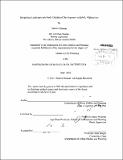| dc.contributor.advisor | James Wescoat. | en_US |
| dc.contributor.author | Thomas, Samira | en_US |
| dc.contributor.other | Massachusetts Institute of Technology. Dept. of Urban Studies and Planning. | en_US |
| dc.coverage.spatial | a-af--- | en_US |
| dc.date.accessioned | 2012-10-10T15:49:16Z | |
| dc.date.available | 2012-10-10T15:49:16Z | |
| dc.date.copyright | 2012 | en_US |
| dc.date.issued | 2012 | en_US |
| dc.identifier.uri | http://hdl.handle.net/1721.1/73828 | |
| dc.description | Thesis (M.C.P.)--Massachusetts Institute of Technology, Dept. of Urban Studies and Planning, 2012. | en_US |
| dc.description | Cataloged from PDF version of thesis. | en_US |
| dc.description | Includes bibliographical references (p. 114-116). | en_US |
| dc.description.abstract | This thesis is an exploration of children's educational interactions with their landscape in Kabul, Afghanistan, and the ways in which landscape, as an important contributor to human development, can be integrated as a topic and as the setting of learning, into the early childhood curriculum in a meaningful and contextually appropriate way. The spaces of learning have increasingly become important components of engagement in education research - the concept of ''environment as teacher" is incorporated into this research study as a critical component of learning. This thesis has explored teacher willingness to participate in integrating landscape into the early childhood curriculum in their school, the Sparks Academy in Kabul, Afghanistan. The concept of landscape was approached both as the space of learning as well as a topic of study. It takes an approach to learning that moves beyond access and into the content and pedagogical style of teaching. This research concludes that Sparks is currently a community of enthusiastic teachers who wish to engage students in their learning in meaningful ways. There is a potential to build on current practices and turn current practice into an even more meaningful learning experience for young children in Kabul, Afghanistan. In particular, it extends the meaning of the Bagh-e-Babur from a space of cultural engagement, to a place of significant learning for Kabul's young. | en_US |
| dc.description.statementofresponsibility | by Samira Thomas. | en_US |
| dc.format.extent | 124 p. | en_US |
| dc.language.iso | eng | en_US |
| dc.publisher | Massachusetts Institute of Technology | en_US |
| dc.rights | M.I.T. theses are protected by
copyright. They may be viewed from this source for any purpose, but
reproduction or distribution in any format is prohibited without written
permission. See provided URL for inquiries about permission. | en_US |
| dc.rights.uri | http://dspace.mit.edu/handle/1721.1/7582 | en_US |
| dc.subject | Urban Studies and Planning. | en_US |
| dc.title | Integrating landscape into early childhood development in Kabul, Afghanistan | en_US |
| dc.type | Thesis | en_US |
| dc.description.degree | M.C.P. | en_US |
| dc.contributor.department | Massachusetts Institute of Technology. Department of Urban Studies and Planning | |
| dc.identifier.oclc | 811559055 | en_US |

